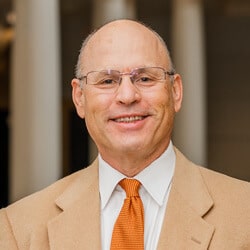Center for Professional Formation
Celebrating its Tenth Anniversary, the Center for Professional Formation (formerly Center for Ethical Formation & Legal Education Reform) develops and manages the programs and resources that Regent Law has designed to develop a student’s professional identity. The Center accentuates Regent Law’s expertise in providing practical training that cultivates the judgment essential to the practice of law. Find us on Instagram
Download a PDF about the Center for Professional Formation
Giving Opportunities
You can be part of the great work we’re doing here at the Center for Professional Formation through giving opportunities, gift matching, and tribute gifts. If you would like to make a gift to the Center for Professional Formation, please contact Pat Trompeter, our Director of Law School Advancement at 757.352.4092 or ptrompeter@regent.edu.
MISSION STATEMENT
The Center’s mission is to help aspiring young lawyers discern God’s purpose in their law practice. The Center achieves its mission in several ways. First, the Center’s nationally recognized mentor program connects students with Christian lawyers and judges who help them recognize how their mentor has responded to God’s call and demonstrate how they can do the same. Second, the Center shows students the process by which they can develop a concrete plan in each of the three years of law school. With this discernment plan as a guide, students are better equipped to explore potential ways to serve God in law. Students refine their discernment plan throughout their law school experience with the support of their alumni and faculty mentors who God has matched according to the student’s gifts and legal needs. Third, the Center provides training in moral development and decision-making. Students hear from their mentors and practicing lawyers about the moral dilemmas inherent in legal practice and how to resolve them. In addition, the Center engages the community by offering Continuing Legal Education (CLE) programs.
THOUGHT LEADERSHIP
The Center’s faculty publishes and presents on the topic of professional identity formation nationwide. The Center also fosters scholarly inquiry into the pedagogy of moral formation by promoting how law professors can learn to teach within both cognitive and affective paradigms. In this effort, the Center has collaborated with individual professors to incorporate ethical formation instruction into their doctrinal teaching. Director Madison co-authored a chapter on the values important to the legal profession in the influential follow-up to the Carnegie Report, Building on Best Practices in Legal Education: Transforming Legal Education in a Changing World (2015).
MENTORING PROGRAM
The Center pairs incoming first-year students with practicing legal professionals who embody integrity and strong moral character. Mentors assist students in preparing for the challenges of the legal profession and in developing a moral compass. For the 10 years that this program has been in existence, 1,000 students have been paired with alumni mentors across the nation.
EVENT PROGRAMMING
The Center sponsors presentations and panels on topics related to ethical decision-making, professional identity development, and character formation—all relevant to real-life practice settings.
As Director Ben Madison observed, “We are on the cutting edge of legal education. The Christian approach to educating lawyers has proved to be a strength in responding to legitimate critiques of legal education’s need to focus not just on intellect but also on the whole person.” The Carnegie Foundation’s landmark report, Educating Lawyers: Preparation for the Practice of Law (2007) indicted law schools for emphasizing intellectual prowess, without spending appropriate time and resources on developing students as professionals. “Regent Law’s mission as a law school to develop Christian leaders to change the world has already led our school to encourage the development of an intentional, Christian, and professional approach to law practice,” Madison observed. Our experience doing so has allowed us to become a leader in the nationwide movement to improve the professional formation of law students.
Last year the American Bar Association adopted standards that require every law school to provide substantial opportunities to students for the development of a student’s professional identity. Regent Law started the process of enhancing its focus on the entire person, and to help that student know that being a professional requires both intellect and character. As a result, we are well ahead of other law schools in meeting the ABA standards.
The Center’s goal is to produce lawyers who understand the nature and purpose of the legal profession and are committed to the ethical practice of law. To that end, the Center has developed the Mentor Program to foster students’ understanding of what it means to practice law with professional and personal integrity. Our mentors represent a variety of practice and geographical legal communities around the country, but each seeks to support and encourage the Center’s mission of encouraging students’ professional identity formation.
During its 10-year existence, the Center has connected nearly 1,000 students to mentors across the nation. Additionally, the Center has been nominated for the ABA’s Gambrell award. It is fair to say that Regent Law is a leader in the movement to educate law students beyond intellectual knowledge and to help develop character.
CORE COURSEWORK
Core courses such as “Christian Foundations of Law” introduce students to classic texts on the nature of the law and legal ethics. Additionally, the “Foundations of Practice” course exposes students to potential ethical problems and how to solve such problems that they may face when practicing in various areas of law. The course also requires students to develop a Discernment Plan, in which they explore—with the help of mentors, faculty, and alumni—the areas of law in which the student is best suited to serve others.
PROFESSIONAL FORMATION
All courses, where possible, encourage students to produce a critical reflection paper on value conflicts and ethical dilemmas, encouraging students to go beyond simply “learning the rules” of ethical practice.
CRITICAL REFLECTION
Every class includes an extra period of reflection designed to explore the dynamics of moral formation and ethical legal practice in the context of biblical principles, virtue ethics, and natural law.
Center Staff

Professor Benjamin V. Madison III teaches Civil Procedure and Pretrial Practice and Procedure. His pretrial practice casebook, Civil Procedure for All States: A Context and Practice Casebook (2010), has drawn praise as one of the first casebooks designed according to the recommendations of the Carnegie Institute in its groundbreaking work, Educating Lawyers (2007). Professor Madison speaks and publishes regularly on helping students discern their calling and develop an integrated professional identity.


